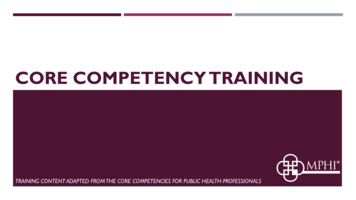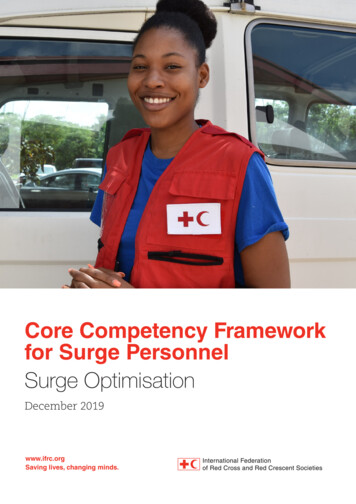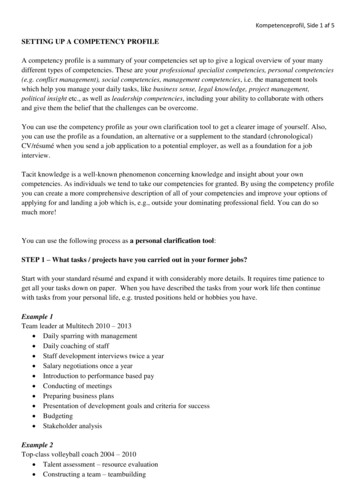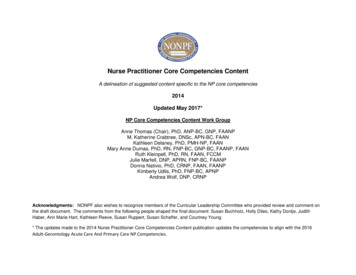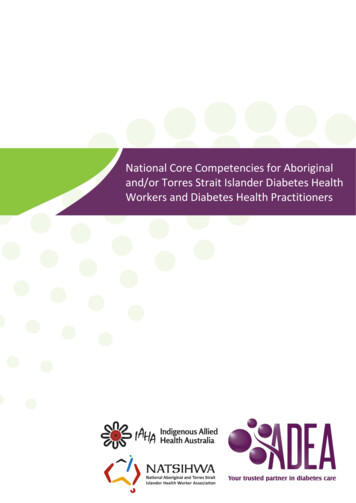
Transcription
National Core Competencies for Aboriginaland/or Torres Strait Islander Diabetes HealthWorkers and Diabetes Health Practitioners
ADEA National Core Competencies for Aboriginal and/or Torres Strait IslanderDiabetes Health Workers and Diabetes Health PractitionersVersion1Date30 May 20171.11.22 June 201714 June 20171.31.416 June 201716 August201717 August2017FinalCEO Approved 17 Aug 2017Name(s)Angela Llewellyn, Jan Alford,Rachel Freeman, Joanne RamadgeProject Advisory GroupAngela Llewellyn, Jan Alford,Rachel Freeman, Joanne RamadgeJoanne RamadgeDonna Murray & Karl BriscoeCEOFor review 2020NotesDraftReview and feedbackRevised textRevised pathwayIdentified minor amendmentsto wordingApproved2
National Core Competencies for Aboriginal and/or Torres Strait Islander Diabetes Health Workers and DiabetesHealth PractitionersExecutive SummaryThe National Core Competencies for Aboriginal and/or Torres Strait Islander Health Workers and HealthPractitioners have been developed by the Australian Diabetes Educators Association (ADEA) in 2017.The competencies have been researched and developed in collaboration with the Project AdvisoryGroup. Other professional bodies and consumers were engaged to ascertain the roles, training, basequalifications and competencies of Aboriginal and/or Torres Strait Islander Health Workers and HealthPractitioners. Consideration has been given to the skills, knowledge and competencies required toprovide culturally appropriate diabetes education.The publication of these core competencies signals a clear commitment on the part of ADEA insupporting Indigenous communities to better health outcomes, improving the lives of Indigenouspeople affected by diabetes and recognising and enhancing the role of Aboriginal and/or Torres StraitIslander Health Workers and Health Practitioners.Aboriginal and Torres Strait Islander people are almost four times more likely to have diabetes or prediabetes than non-Indigenous, and diabetes was found to be more than double in remote areas (21%)compared with non-remote areas (9%) (1). Type 2 diabetes is a significant contributor to morbidity andmortality rates for Indigenous adults.Clear and transparent processes and standards have been established for identifying what should beexpected of Aboriginal and/or Torres Strait Islander Health Workers and Health Practitioners and whatshould be expected by their clients, peers and employers. These standards align with other relevantstandards for Aboriginal and/or Torres Strait Islander Health Workers and Health Practitioners.Qualifications assessed and compared in the process to develop diabetes competency standards were: Certificate III in Aboriginal and/or Torres Strait Islanders Primary Health CareCertificate IV in Aboriginal and/or Torres Strait Islanders Primary Health CareCertificate IV in Aboriginal and/or Torres Strait Islanders Primary Health Care (Practice)Diploma in Aboriginal and/or Torres Strait Islanders Primary Health CareDiploma in Aboriginal and/or Torres Strait Islanders Primary Health Care (Practice)Enrolled Nursing.This document provides a framework for guiding policy on the diabetes training of Aboriginal and/orTorres Strait Islander Health Workers and Health Practitioners for the next three years.The process, structure and expected outcomes of diabetes education have been clearly articulated forhealth professionals (2) (3). In an era of burgeoning chronic disease and a focus on the central role ofthe person with diabetes in managing their condition, the integral role of diabetes self-managementeducation has been clearly identified as a core component of effective diabetes care systems. Thesecompetency standards reflect the scope of practice for Aboriginal and/or Torres Strait Islander HealthWorkers and Health Practitioners and cover the following domains: Clinical PracticeEducation and CounsellingResearch and Quality ImprovementManagement and AdministrationCEO Approved 17 Aug 2017For review 20203
National Core Competencies for Aboriginal and/or Torres Strait Islander Diabetes Health Workers and DiabetesHealth Practitioners Leadership and AdvocacyKeywordsCredentialled Diabetes Educators (CDE)Core CompetenciesCompetency StandardsContinuing Professional Development (CPD)Copyright 2017 ADEAAll rights reserved. This document or part thereof may not be reproduced or used withoutacknowledgement of the publisher. The document may be printed in its current unchanged form for useby health professionals working in diabetes education, management and care to benefit people livingwith diabetes.DisclaimerThe information set out in this publication is current at the date of first publication. It is not exhaustiveof this subject matter. This document is a guide to practice and cannot by itself guarantee discharge ofduty of care owed to patients and support people.Suggested citationAustralian Diabetes Educators Association (ADEA), National Core Competencies for Aboriginal and/orTorres Strait Islander Diabetes Health Workers and Diabetes Health Practitioners. Canberra: 2017CEO Approved 17 Aug 2017For review 20204
National Core Competencies for Aboriginal and/or Torres Strait Islander Diabetes Health Workers and DiabetesHealth PractitionersAcknowledgementsADEA members and the advisory group of the Indigenous Pathways Project have given generously oftheir time in the development of this document.ADEA particularly acknowledges the work and assistance of:Jan Alford RN CDE – ChairAngela Llewellyn RN CDE - Project OfficerDr Joanne Ramadge CEO ADEARachel Freeman APD CDE, Professional Services Manager ADEAKarl Briscoe CEO National Aboriginal and Torres Strait Islander Health Workers Association (NATSIHWA)Donna Murray CEO Indigenous Allied Health AustraliaBernadette Heenan RN CDE, Apunipima Cape York Health CouncilCatherine Dowey RN CDE, Apunipima Cape York Health CouncilTricia Elarde NDSS Priority Leader for Aboriginal & Torres Strait Islander People, Diabetes QueenslandKarina Demasi Workforce & Public Health Policy Officer Aboriginal Medical Services of the NorthernTerritory (AMSANT)About ADEAThe Australian Diabetes Educators Association (ADEA) is the peak national organisation formultidisciplinary health professionals who are committed to the provision and excellence of quality,evidence-based diabetes education, care and management with over 2,100 members working in allsectors and across all locations.ADEA aims to improve the health and wellbeing of people with diabetes by:1. providing a credentialling program that establishes standards for the qualifications, skills,knowledge and experience for diabetes educators2. supporting multidisciplinary health professionals through its various programs, includingmentoring, education and research3. developing and updating relevant policies, standards of practice and clinical guidelines4. advocating for equitable access for all people affected by diabetes to best practice diabeteseducation and care services.For more information, visit our website at www.adea.com.au.CEO Approved 17 Aug 2017For review 20205
National Core Competencies for Aboriginal and/or Torres Strait Islander Diabetes Health Workers and DiabetesHealth PractitionersKey DefinitionsAboriginal and/or Torres Strait Islander Diabetes Health Worker and Diabetes Health Practitioner: Theproposed terms for health professionals that meet the core competencies as outlined in this document.Competency: can be defined as “the state of having the knowledge, judgement, skills, energy,experience and motivation to respond adequately to the demands of one’s professional responsibility”(4).Competency standards: are a set of benchmarks used to assess the skills and knowledge of a person.They are used as a basis for defining learning outcomes and assesses performance within a professionalpractice. They specify knowledge and skill, and the application of that knowledge and skill, in theworkplace.Continuing Professional Development (CPD) is how health practitioners maintain, improve andbroaden their knowledge, expertise and competence, and develop the personal and professionalqualities required throughout their professional lives (5).Scope of practice: the procedures, actions and processes in which a health professional is authorised,educated and competent to perform (6).CEO Approved 17 Aug 2017For review 20206
National Core Competencies for Aboriginal and/or Torres Strait Islander Diabetes Health Workers and DiabetesHealth PractitionersTable of ContentsADEA National Core Competencies for Aboriginal and/or Torres Strait Islander Diabetes HealthWorkers and Diabetes Health Practitioners . 2Executive Summary. 3Keywords. 4Copyright 2017 ADEA. 4Disclaimer. 4Suggested citation. 4Acknowledgements. 5About ADEA. 5Key Definitions . 61.Introduction . 82.Key aims of this document. 83. Role and Scope of practice of an Aboriginal and/or Torres Strait Islander Diabetes Health Workerand Diabetes Health Practitioner. 8Definition of an Aboriginal and/or Torres Strait Islander Diabetes Health Worker and Diabetes HealthPractitioner . 84. Core Competency Domains for Aboriginal and/or Torres Strait Islander Diabetes Health Workersand Diabetes Health Practitioners . 95.Development of the core competencies . 106.Format and Layout of this Document . 10Pathway to Diabetes Education for Aboriginal and/or Torres Strait Islander Health Workers and HealthPractitioners . 117.Core Competency Domains and Skills. 12Domain 1: Clinical Practice. 12Domain 2: Education and Counselling . 14Domain 3: Research and Quality Improvement . 15Domain 4: Management and Administration . 16Domain 5: Leadership and Advocacy . 17References . 18CEO Approved 17 Aug 2017For review 20207
National Core Competencies for Aboriginal and/or Torres Strait Islander Diabetes Health Workers and DiabetesHealth Practitioners1. IntroductionThe Australian Diabetes Educators Association (ADEA) was formed in 1981 and is the leading Australianorganisation for health care professionals providing diabetes education and care.The ADEA is committed to development and continuous improvement of professional standards toensure optimal person centred service provision for people living with diabetes.Diabetes self-management education with clinical care should be a part of a therapeutic intervention topromote physical, social, spiritual and psychological wellbeing.2. Key aims of this documentThe key aims of this document is to: define the minimum competencies required by ADEA for Aboriginal and/or Torres Strait IslanderDiabetes Health Workers and Diabetes Health Practitioners. provide Aboriginal and/or Torres Strait Islander Health Workers and Health Practitioners with aframework for identifying their own professional development and practice needs in order tomeet requirements for recognition as an Aboriginal and/or Torres Strait Islander DiabetesHealth Worker or Diabetes Health Practitioner describe the performance standards consumers and employers can expect of an Aboriginaland/or Torres Strait Islander Diabetes Health Worker or Diabetes Health Practitioner.3. Role and Scope of practice of an Aboriginal and/or Torres Strait IslanderDiabetes Health Worker and Diabetes Health PractitionerDefinition of an Aboriginal and/or Torres Strait Islander Diabetes Health Workerand Diabetes Health PractitionerThe designation Aboriginal and/or Torres Strait Islander Diabetes Health Worker and Diabetes HealthPractitioner identifies those people who demonstrate they meet the standards for diabetes educationwithin their scope of practice. The use of this designation will assist employers, colleagues and patientsin understanding the specialist role of those who have achieved it. It provides recognition of evidencebased practice in diabetes and a higher level of clinical knowledge.‘Aboriginal and/or Torres Strait Islander Diabetes Health Worker or Diabetes Health Practitioner’ is thenationally recognised title recommended for the quality assured provision of diabetes education at aminimum Cert 4 Level. It is a specialty area of practice that is both a therapeutic and educationalintervention.Aboriginal and/or Torres Strait Islander Diabetes Health Workers and Diabetes Health Practitioners arerequired to adopt a person centred approach when providing diabetes self-management and educationto those living with diabetes to allow individuals to: develop the knowledge, skills and confidence for the everyday management of diabetesunderstand their personal health risksCEO Approved 17 Aug 2017For review 20208
National Core Competencies for Aboriginal and/or Torres Strait Islander Diabetes Health Workers and DiabetesHealth Practitioners explore the meaning and implications of these risks in the context of personal, social andcultural influences and in terms of current lifestyle behavioursactivate the determination of a comprehensive self-management plan that will maximisehealth outcomes.4. Core Competency Domains for Aboriginal and/or Torres Strait IslanderDiabetes Health Workers and Diabetes Health PractitionersAboriginal and/or Torres Strait Islander Diabetes Health Workers and Diabetes Health Practitioners maywork in a variety of practice settings within Indigenous communities, and work in roles that span theintervention and care continuum. Aboriginal and/or Torres Strait Islander Diabetes Health Workers andDiabetes Health Practitioners is underpinned by a core body of knowledge, skills and activity in thefollowing domains: Clinical PracticeEducation and CounsellingResearch and Quality ImprovementManagement and AdministrationLeadership and AdvocacyAboriginal and/or Torres Strait Islander Diabetes Health Workers and Diabetes Health Practitioners havea duty of care to ensure they acquire and maintain the requisite knowledge and competence to enablethem to perform their role safely, effectively and in a manner that supports optimal outcomes for allIndigenous people with, or at risk of developing, diabetes.In order to do this an Aboriginal and/or Torres Strait Islander Diabetes Health Worker and DiabetesHealth Practitioner should demonstrate how they: apply knowledge and understanding of best practice treatment, management and care ofpeople with prediabetes and diabetes.apply evidence based education and self-management techniques to improve outcomes forpeople with prediabetes and diabetes.contribute to research and quality improvement to build the evidence base to supportimprovements in self-management prediabetes and diabetes education and care.apply principles of program management to contribute to the safe, effective and efficientdelivery of diabetes services that supports successful self-management of prediabetes anddiabetesprovide expertise and leadership within the health profession and advocate for best practicediabetes care for all people living with prediabetes and diabetes.The underlying assumptions in the development of these competencies are that:ooAboriginal and/or Torres Strait Islander Health Practitioners remain individuallyaccountable to their AHPRA registration requirementsAboriginal and/or Torres Strait Islander Health Workers and Health Practitionersprovide clinical care consistent with the standards set by relevant national, state, localand institutional regulations and guidelines that guide their professional practice.CEO Approved 17 Aug 2017For review 20209
National Core Competencies for Aboriginal and/or Torres Strait Islander Diabetes Health Workers and DiabetesHealth Practitioners5. Development of the core competenciesA desk review of core competencies of the following TAFE courses was conducted and compared tothe core competencies required at the post graduate level in diabetes education.Certificate III in Aboriginal and/or Torres Strait Islanders Primary Health CareCertificate IV in Aboriginal and/or Torres Strait Islanders Primary Health CareCertificate IV in Aboriginal and/or Torres Strait Islanders Primary Health Care (Practice)Diploma in Aboriginal and/or Torres Strait Islanders Primary Health CareDiploma in Aboriginal and/or Torres Strait Islanders Primary Health Care (Practice)Enrolled Nursing.The following competencies have been developed in line with the: Certificate IV in Aboriginal and/or Torres Strait Islander Primary Health Care (Practice).Characteristics Certificate IVImplementation Handbook Fourth Edition 2007Characteristics of learning outcomes/competencies include: performance of a broad range of skilled applications including requirements to evaluate andanalyse current practices, assist to develop new criteria and procedures for performing currentpractices, and provision of some guidance to others in the application and planning of the skillsbreadth, depth and complexity of knowledge and competencies would cover a broad range ofvaried activities or applications in a wider variety of contexts most of which are complex andnon-routine. Motivation and skill in organising activities of self and others as well as contributingto technical solutions of a non-routine or contingency natureapplications involve some responsibility for, and limited organisation of others.6. Format and Layout of this DocumentUnder each domain of competency there is a list of skills, knowledge and values that make up thecompetency. Aboriginal and/or Torres Strait Islander Diabetes Health Workers and Diabetes HealthPractitioners should endeavour to maintain core competency under each domain of practice.Under each domain are cues or examples of what behaviours, skills or activities a person at each levelwould be expected to display.This document should be used as a tool to guide the career as an Aboriginal and/or Torres Strait IslanderDiabetes Health Workers and Diabetes Health Practitioners have and to ensure that on-goingprofessional education and development is directed at not only maintaining the core competencies butworking towards becoming more proficient in all domains.A pathway to recognition as an Aboriginal and/or Torres Strait Islander Diabetes Health Worker andDiabetes Health Practitioner or Credentialling as a Diabetes Educator is shown below.CEO Approved 17 Aug 2017For review 202010
National Core Competencies for Aboriginal and/or Torres Strait Islander Diabetes Health Workers and DiabetesHealth PractitionersPathway to Diabetes Education for Aboriginal and/or Torres Strait Islander HealthWorkers and Health PractitionersAboriginal and/or Torres Strait Islander Health Worker or Health PractitionerA diabetes coursethat meets the standards as set out belowAboriginal and/or Torres Strait Islander Diabetes Health Worker orDiabetes Health PractitionerAppropriate Undergraduate degree recognised for ADEA CredentiallingPost Graduate Certificate inDiabetes Education andManagementAboriginal and/or Torres StraitIslanders Health Workers andHealth Practitioners who completethe post graduate degree canundertake the credentiallingprocess (this will be reviewed in2020)Credentialling as a Diabetes Educator as per criteriaCEO Approved 17 Aug 2017For review 202011
National Core Competencies for Aboriginal and/or Torres Strait Islander Diabetes Health Workers and DiabetesHealth Practitioners7. Core Competency Domains and SkillsThe following are the core competencies and cues that will help an Aboriginal and/or Torres StraitIslander Health Worker or Health Practitioner in meeting each of the competency domains.Domain 1: Clinical PracticeCompetency:Aboriginal and/or Torres Strait Islander Diabetes Health Workers and Diabetes Health Practitionersapply knowledge of best practice treatment, management and care to people with prediabetes anddiabetes.They work within an interdisciplinary team to tailor clinical interventions to the individual and tomaximise the health outcomes for all people living with, or at risk of developing diabetes.Core skills, knowledge and valuesAboriginal and/or Torres Strait Islander Diabetes Health Workers and Diabetes Health Practitioners: apply or promote current principles of evidence based practice to the treatment, managementand care of people living with prediabetes and diabetes provide or promote clinical care that is consistent with the applicable regulatory frameworkgoverning Aboriginal and/or Torres Strait Islander Health Workers and Health Practitioners apply or promote systematic and comprehensive person-centred care that is delivered acrossthe lifespan clearly articulate the differences between prediabetes, type 1 diabetes, type 2 diabetes,gestational diabetes and other types of diabetes clearly articulate the factors associated with the development of diabetes recognise and manage hypoglycaemia and hyperglycaemia describe the interrelationship between nutrition, exercise, stress, and medications for diabetesmanagement explain how to use medicines to effectively manage diabetes explain the relationship between diabetes and other conditions (e.g. heart disease, kidneydisease) explain the relationship between diabetes and microvascular disease explain the basic components of treatment appropriate for each type of diabetes explain the interdisciplinary nature of the management and support of a person living withdiabetes utilise clinical assessment to interpret and monitor clinical indicators of general health statusand metabolic management, and accurately analyse this information to guide clinical decisionmaking and referral.Cues: consults and provides education whereby the person with diabetes is the central person in the dayto day management of their condition and supports clients to take an active part in itsmanagementrefers to professional practice guidelines when providing clinical careexplains how to use medicines to effectively manage diabetesseeks support from others in complex casesseeks to improve and maintain clinical knowledge and skillsCEO Approved 17 Aug 2017For review 202012
National Core Competencies for Aboriginal and/or Torres Strait Islander Diabetes Health Workers and DiabetesHealth Practitioners adheres to the regulatory framework and decision making framework within which he/shepracticesprovides accurate information on prediabetes, all types of diabetes to clients, other healthprofessionals and other members of the communityprovides accurate information about the interrelationship between nutrition, exercise, stress, andmedications for diabetes managementaccurately undertakes a clinical assessment of the person living with or at risk of developingdiabetes and effectively actions on clinical indicatorseffectively communicates progress with other health professionalsidentifies the need to refer for clinical care outside their expertise and selects appropriate servicesuses appropriate and validated tools to assess the needs of the person with diabetesactively collaborates with the person with diabetes, the referring practitioner and other membersof the diabetes care team to establish agreed clinical targets.CEO Approved 17 Aug 2017For review 202013
National Core Competencies for Aboriginal and/or Torres Strait Islander Diabetes Health Workers and DiabetesHealth PractitionersDomain 2: Education and CounsellingCompetency:Aboriginal and/or Torres Strait Islander Diabetes Health Workers and Diabetes Health Practitionersapply evidence based education and self-management skills, interventions and techniques toimprove outcomes for people living with prediabetes and diabetes.They work within an interdisciplinary diabetes team to tailor interventions to individual selfmanagement education needs.Core skills, knowledge and valuesAboriginal and/or Torres Strait Islander Diabetes Health Workers and Diabetes Health Practitioners: refer to and apply evidence based guidelines and innovative techniques to enhancecommunication and self-management behaviours demonstrate appropriate communication and counselling skills to facilitate informeddecision making by the person with diabetes understand and utilise evidence based education and motivational techniques to assistwith the education, behaviour change and support of people living with or at risk ofdeveloping diabetes utilises a person-centred approach that is cognisant of the person with diabetes/theircarer’ cultural, economic and social background and life stage when educating andsupporting the person living with diabetes or at risk of developing diabetes customise programmes or interventions to accommodate the age, literacy level, culturalbackground, and physical, or cognitive abilities of the person living with diabetes or at riskof developing diabetes apply cultural competency principles to maximise therapeutic relationships with allindividuals in their care apply problem solving techniques and a non-judgemental approach when dealing withpeople living with diabetes or at risk of developing diabetes.Cues: applies health behaviour and educational theory to inform, motivate and support a person livingwith diabetes throughout their lifespanassists the client to establish realistic, meaningful self-management goals and success metricsapplies exploratory questioning and reflective listening techniques to enhance communication andunderstandingassesses the client’s understanding of the relevant clinical and self-management options availableto themseeks guidance from more experienced diabetes educators when alternative approaches may berequired to support and educate the clientconsults and provides education whereby the person with diabetes is the central person in the dayto day management of their condition and supports clients to take an active part in itsmanagementseeks feedback from the client and acts on any feedback to make changes to practiceis non-judgemental and respects for choices made by the person with diabetes/their carerseffectively communicates progress with other health professionalskeeps up to date with digital health information and mobile technology that promotes andenhances diabetes self-management.CEO Approved 17 Aug 2017For review 202014
National Core Competencies for Aboriginal and/or Torres Strait Islander Diabetes Health Workers and DiabetesHealth PractitionersDomain 3: Research and Quality ImprovementCompetency:Aboriginal and/or Torres Strait Islander Diabetes Health Workers and Diabetes Health Practitionerscontribute to research and quality improvement to build the evidence base to support improvementsin self-management prediabetes and diabetes education and care.Core skills, knowledge and valuesAboriginal and/or Torres Strait Islander Diabetes Health Workers and Diabetes Health Practitioners: are committed to improving the quality and outcomes of treatment, management and carefor people living with prediabetes and diabetes through participation through ongoingquality management contribute to the monitoring and evaluation of the education and care provided at theindividual, program and, where possible, at the population level apply quality improvement principles when undertaking or contributing to qualityimprovement activities explain how research has been used to develop evidence based guidelines and resources demonstrate basic skills in research methodo
Tricia Elarde NDSS Priority Leader for Aboriginal & Torres Strait Islander People, Diabetes Queensland . National Core Competencies for Aboriginal and/or Torres Strait Islander Diabetes Health Workers and Diabetes Health Practitioners CEO Approved 17 Aug 2017 For review 2020 9 explore the meaning and implications of these risks in the context .

